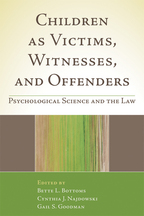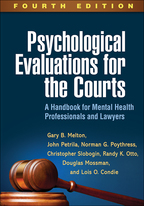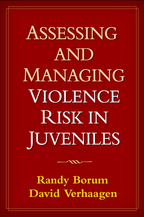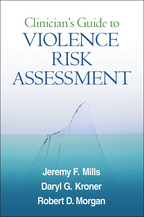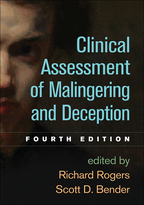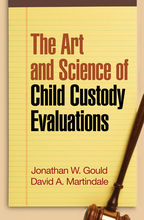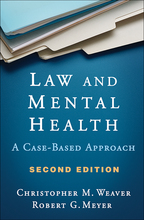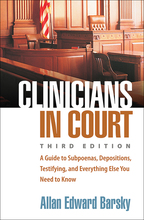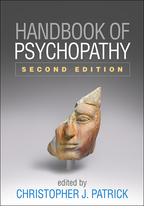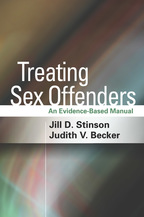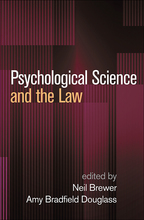Children as Victims, Witnesses, and Offenders
Psychological Science and the Law
Edited by Bette L. Bottoms, Cynthia J. Najdowski, and Gail S. Goodman
Hardcovere-bookprint + e-book
Hardcover
orderAugust 10, 2009
ISBN 9781606233320
Price: $64.00412 Pages
Size: 6" x 9"
“Provides both academics and legal professionals with an accessible resource that educates the reader about contemporary research and policy, providing an organized summary of the psychological research and the implications of these scientific findings for legal and social service offices and courtrooms around the world....Bottoms and colleagues' book is written by widely respected legal and social science scholars, and allows the reader to recognize that the difficulties faced as victim, witness, and offender are at times distinct, but at other times, very similar....Goes beyond covering the critical issues and presenting the latest psychological science on each topic. In addition to including an international perspective in both the sections on child victims and child offenders, the authors also place all of the issues and the many questions raised throughout the book in the context of cited legal cases that illustrates the need for the legal system to make use of the psychological literature to address these issues using sound scientific evidence. For anyone in the field who strives to create a system that meets the needs of children as victims, witnesses, or offenders, whether a researcher, lawyer, judge, investigator, social worker, educators at the undergraduate or graduate level in any number of related disciplines, or anyone studying to become involved in the field, this book will review the most current scientific research and make clear all of the critical issues on which to focus in the classroom, in the lab, and throughout the legal system. All of this is accomplished in chapters that are very well written and in a book that clearly presents the challenges faced when children become involved in the legal system.”

—American Psychology-Law News
“Offers a balanced, up-to-date review and critique of issues imperative to children's involvement in the legal system. The editors have brought together a renowned group of legal and social science scholars to address questions central in contemporary debates: When, and under what conditions, can researchers and practitioners believe children? What are children's competencies or vulnerabilities as victims, witnesses, and offenders? How are children treated within a legal context, and what accommodations are necessary?....Throughout this volume, the editors deliver on their promise to support a holistic approach to research and practice with child victims and offenders....Perhaps most important, the contributors urge professionals to consider new paradigms and collaborations to create a deeper understanding of how the justice system can better serve children and youth.”

—Law and Society Review
“Presents current research by leading authorities with important implications for the legal procedures, laws, and policies that determine children's experiences in court, identifying legal strategies and procedures that are not informed by research and additionally provides more appropriate alternatives....The Editors have assembled the most relevant information from a large research base....A major strength of this book is the high quality of the empirical evidence presented and how the chapters synthesize a considerable body of research....The authors expand on different themes, answer multiple questions, and offer sound recommendations. The scholars offer critiques of past and current approaches to accommodating children, provide a clear rationale relating to why certain practices are problematic for children and present viable alternatives for better serving youth within the legal context....Vital for professionals committed to helping youth navigate the legal justice system in any capacityincluding investigators, child advocates, psychology and legal researchers, lawyers, forensic evaluators, social workers, medical professionals, psychiatrists, and judges. Additionally, this book would be an important addition to forensic clinical psychological graduate programs' curricula.”

—Child and Family Behavior Therapy
“Each chapter of this book covers a crucial aspect in working with this at-risk population. It should be required reading by any clinician, forensic interviewer, attorney, student, or expert witness who works with children and families involved in our legal system. This comprehensive reference book covers topics in two areas: children as victims and witnesses, and children as offenders. The attempt made by its editors to cover research in both areas is what makes this book especially crucial reading....The editors have done an excellent job gathering a group of prominent clinicians and researchers to summarize the important topics related to children in the crossroads of the legal system. The book's strength is in its ability to clearly and succinctly summarize the up to date research necessary for any individual working in this multifaceted field. The book is clearly state of the art and should be a resource book to every student and professional working with children involved in the legal system.”

—Journal of Child and Adolescent Trauma
“Provides both academics and legal professionals with an accessible resource that educates the reader about contemporary research and policy, providing an organized summary of the psychological research and the implications of these scientific findings for legal and social service offices and courtrooms around the world....Bottoms and colleagues' book is written by widely respected legal and social science scholars, and allows the reader to recognize that the difficulties faced as victim, witness, and offender are at times distinct, but at other times, very similar....Goes beyond covering the critical issues and presenting the latest psychological science on each topic. In addition to including an international perspective in both the sections on child victims and child offenders, the authors also place all of the issues and the many questions raised throughout the book in the context of cited legal cases that illustrates the need for the legal system to make use of the psychological literature to address these issues using sound scientific evidence. For anyone in the field who strives to create a system that meets the needs of children as victims, witnesses, or offenders, whether a researcher, lawyer, judge, investigator, social worker, educators at the undergraduate or graduate level in any number of related disciplines, or anyone studying to become involved in the field, this book will review the most current scientific research and make clear all of the critical issues on which to focus in the classroom, in the lab, and throughout the legal system. All of this is accomplished in chapters that are very well written and in a book that clearly presents the challenges faced when children become involved in the legal system. -American Psychology”

—Law News
“This scholarly book provides the clinician with essential background information about children who appear in court proceedings as a victim, a witness, or a defendant....All chapters are well referenced, with research data juxtaposed with courtroom vignettes....A useful comprehensive reference book for child and adolescent psychiatrists. The book provides a developmental perspective regarding children's capacities as they relate to the expectations of a victim, witness, or offender in the justice system. It also provides a clear understanding of what the psychiatrist needs to know in order to work effectively within the justice system.”

—Journal of the Canadian Academy of Child and Adolescent Psychiatry
“Chapters, written by widely respected legal and social science scholars, examine several key questions associated with children's involvement in the legal system….I urge all practitioners, legal, forensic, and lay, to read the chapter on Police Interrogation and False Confessions, digest it, assimilate it, and use the knowledge to advocate for our youthful charges. I anticipate that readers of this chapter will be seduced into reading other chapters in this book that will advance their knowledge and skills.”

—Journal of the American Academy of Psychiatry and the Law
“This excellent resource provides a wealth of information. Reviewing critical themes such as methods of disclosure, trauma, memory suggestibility, and the evolution of forensic interviewing, the contributors promote a more holistic approach for child victims and offenders. There are few texts that address child offenders in as comprehensive and thoughtful a fashion. Including international perspectives and visions for best practices in the future, this book is a key addition to the toolkits of psychological, medical, and legal professionals serving children involved in any aspect of the justice process.”

—Sharon W. Cooper, MD, FAAP, Consultant, National Center for Missing and Exploited Children; Department of Pediatrics, University of North Carolina School of Medicine
“Few topics in psychology and law have attracted as much attention as the challenging conflicts posed when children encounter the legal system as victims or offenders. This volume is both comprehensive and nuanced, assembling experts in the field to describe what we know and what we have yet to learn.”

—Shari Seidman Diamond, JD, PhD, Howard J. Trienens Professor of Law and Professor of Psychology, Northwestern University School of Law; Research Professor, American Bar Foundation
“Bottoms, Najdowski, and Goodman have called on world-class colleagues to put together this definitive volume. Each state-of-the-science chapter addresses the application of research findings in legal contexts. This book will be indispensable for mental health experts in child maltreatment as well as lawyers involved in child advocacy.”

—Kathleen Coulborn Faller, PhD, ACSW, Marion Elizabeth Blue Professor of Children and Families and Director, Family Assessment Clinic, School of Social Work, University of Michigan
“The editors have assembled an internationally renowned group of experts to craft an authoritative volume that integrates the best behavioral science with important case law decisions. The resulting chapters do not disappoint. Readers will find the essentials they need regarding child victims and offenders, linked closely to key legal decisions and packed with valuable recommendations. Faculty teaching upper-level undergraduate seminars and graduate courses across disciplines that deal with crimes against children will want to consider adopting this book. Child protection professionals, many attorneys, and students planning to work in this arena will find it essential reading.”

—Gerald P. Koocher, PhD, ABPP, Professor and Dean, School of Health Sciences, Simmons College
“The fields of law and psychology have been moving toward a restructuring of justice for children—as victims and as offenders—that makes use of new, scientifically informed perspectives on child development. This volume is a definitive milestone in the progress of that movement. Above all, it is authoritative. Leading researchers have written succinct reviews of their respective areas of expertise, in a style that will be understandable to practitioners and policymakers. Offering updates on questions that have been asked for decades, the chapters also provide new information on issues addressed nowhere else. This book promises to both inform and organize our thinking about how law can best respond to children who are harmed or who harm others.”

—Thomas Grisso, PhD, Department of Psychiatry (Emeritus), University of Massachusetts Medical School
“Although much has been written about child abuse victims and juvenile offenders in the last two decades, these literatures have not previously been presented together in such an authoritative, comprehensive, and accessible way. This book is both a resource for established scholars and a well-written introduction for students in applied developmental, forensic, and clinical psychology, as well as social work and juvenile and family law.”

—Michael E. Lamb, PhD, Head, Department of Social and Developmental Psychology, University of Cambridge, UK
—American Psychology-Law News
“Offers a balanced, up-to-date review and critique of issues imperative to children's involvement in the legal system. The editors have brought together a renowned group of legal and social science scholars to address questions central in contemporary debates: When, and under what conditions, can researchers and practitioners believe children? What are children's competencies or vulnerabilities as victims, witnesses, and offenders? How are children treated within a legal context, and what accommodations are necessary?....Throughout this volume, the editors deliver on their promise to support a holistic approach to research and practice with child victims and offenders....Perhaps most important, the contributors urge professionals to consider new paradigms and collaborations to create a deeper understanding of how the justice system can better serve children and youth.”
—Law and Society Review
“Presents current research by leading authorities with important implications for the legal procedures, laws, and policies that determine children's experiences in court, identifying legal strategies and procedures that are not informed by research and additionally provides more appropriate alternatives....The Editors have assembled the most relevant information from a large research base....A major strength of this book is the high quality of the empirical evidence presented and how the chapters synthesize a considerable body of research....The authors expand on different themes, answer multiple questions, and offer sound recommendations. The scholars offer critiques of past and current approaches to accommodating children, provide a clear rationale relating to why certain practices are problematic for children and present viable alternatives for better serving youth within the legal context....Vital for professionals committed to helping youth navigate the legal justice system in any capacityincluding investigators, child advocates, psychology and legal researchers, lawyers, forensic evaluators, social workers, medical professionals, psychiatrists, and judges. Additionally, this book would be an important addition to forensic clinical psychological graduate programs' curricula.”
—Child and Family Behavior Therapy
“Each chapter of this book covers a crucial aspect in working with this at-risk population. It should be required reading by any clinician, forensic interviewer, attorney, student, or expert witness who works with children and families involved in our legal system. This comprehensive reference book covers topics in two areas: children as victims and witnesses, and children as offenders. The attempt made by its editors to cover research in both areas is what makes this book especially crucial reading....The editors have done an excellent job gathering a group of prominent clinicians and researchers to summarize the important topics related to children in the crossroads of the legal system. The book's strength is in its ability to clearly and succinctly summarize the up to date research necessary for any individual working in this multifaceted field. The book is clearly state of the art and should be a resource book to every student and professional working with children involved in the legal system.”
—Journal of Child and Adolescent Trauma
“Provides both academics and legal professionals with an accessible resource that educates the reader about contemporary research and policy, providing an organized summary of the psychological research and the implications of these scientific findings for legal and social service offices and courtrooms around the world....Bottoms and colleagues' book is written by widely respected legal and social science scholars, and allows the reader to recognize that the difficulties faced as victim, witness, and offender are at times distinct, but at other times, very similar....Goes beyond covering the critical issues and presenting the latest psychological science on each topic. In addition to including an international perspective in both the sections on child victims and child offenders, the authors also place all of the issues and the many questions raised throughout the book in the context of cited legal cases that illustrates the need for the legal system to make use of the psychological literature to address these issues using sound scientific evidence. For anyone in the field who strives to create a system that meets the needs of children as victims, witnesses, or offenders, whether a researcher, lawyer, judge, investigator, social worker, educators at the undergraduate or graduate level in any number of related disciplines, or anyone studying to become involved in the field, this book will review the most current scientific research and make clear all of the critical issues on which to focus in the classroom, in the lab, and throughout the legal system. All of this is accomplished in chapters that are very well written and in a book that clearly presents the challenges faced when children become involved in the legal system. -American Psychology”
—Law News
“This scholarly book provides the clinician with essential background information about children who appear in court proceedings as a victim, a witness, or a defendant....All chapters are well referenced, with research data juxtaposed with courtroom vignettes....A useful comprehensive reference book for child and adolescent psychiatrists. The book provides a developmental perspective regarding children's capacities as they relate to the expectations of a victim, witness, or offender in the justice system. It also provides a clear understanding of what the psychiatrist needs to know in order to work effectively within the justice system.”
—Journal of the Canadian Academy of Child and Adolescent Psychiatry
“Chapters, written by widely respected legal and social science scholars, examine several key questions associated with children's involvement in the legal system….I urge all practitioners, legal, forensic, and lay, to read the chapter on Police Interrogation and False Confessions, digest it, assimilate it, and use the knowledge to advocate for our youthful charges. I anticipate that readers of this chapter will be seduced into reading other chapters in this book that will advance their knowledge and skills.”
—Journal of the American Academy of Psychiatry and the Law
“This excellent resource provides a wealth of information. Reviewing critical themes such as methods of disclosure, trauma, memory suggestibility, and the evolution of forensic interviewing, the contributors promote a more holistic approach for child victims and offenders. There are few texts that address child offenders in as comprehensive and thoughtful a fashion. Including international perspectives and visions for best practices in the future, this book is a key addition to the toolkits of psychological, medical, and legal professionals serving children involved in any aspect of the justice process.”
—Sharon W. Cooper, MD, FAAP, Consultant, National Center for Missing and Exploited Children; Department of Pediatrics, University of North Carolina School of Medicine
“Few topics in psychology and law have attracted as much attention as the challenging conflicts posed when children encounter the legal system as victims or offenders. This volume is both comprehensive and nuanced, assembling experts in the field to describe what we know and what we have yet to learn.”
—Shari Seidman Diamond, JD, PhD, Howard J. Trienens Professor of Law and Professor of Psychology, Northwestern University School of Law; Research Professor, American Bar Foundation
“Bottoms, Najdowski, and Goodman have called on world-class colleagues to put together this definitive volume. Each state-of-the-science chapter addresses the application of research findings in legal contexts. This book will be indispensable for mental health experts in child maltreatment as well as lawyers involved in child advocacy.”
—Kathleen Coulborn Faller, PhD, ACSW, Marion Elizabeth Blue Professor of Children and Families and Director, Family Assessment Clinic, School of Social Work, University of Michigan
“The editors have assembled an internationally renowned group of experts to craft an authoritative volume that integrates the best behavioral science with important case law decisions. The resulting chapters do not disappoint. Readers will find the essentials they need regarding child victims and offenders, linked closely to key legal decisions and packed with valuable recommendations. Faculty teaching upper-level undergraduate seminars and graduate courses across disciplines that deal with crimes against children will want to consider adopting this book. Child protection professionals, many attorneys, and students planning to work in this arena will find it essential reading.”
—Gerald P. Koocher, PhD, ABPP, Professor and Dean, School of Health Sciences, Simmons College
“The fields of law and psychology have been moving toward a restructuring of justice for children—as victims and as offenders—that makes use of new, scientifically informed perspectives on child development. This volume is a definitive milestone in the progress of that movement. Above all, it is authoritative. Leading researchers have written succinct reviews of their respective areas of expertise, in a style that will be understandable to practitioners and policymakers. Offering updates on questions that have been asked for decades, the chapters also provide new information on issues addressed nowhere else. This book promises to both inform and organize our thinking about how law can best respond to children who are harmed or who harm others.”
—Thomas Grisso, PhD, Department of Psychiatry (Emeritus), University of Massachusetts Medical School
“Although much has been written about child abuse victims and juvenile offenders in the last two decades, these literatures have not previously been presented together in such an authoritative, comprehensive, and accessible way. This book is both a resource for established scholars and a well-written introduction for students in applied developmental, forensic, and clinical psychology, as well as social work and juvenile and family law.”
—Michael E. Lamb, PhD, Head, Department of Social and Developmental Psychology, University of Cambridge, UK

